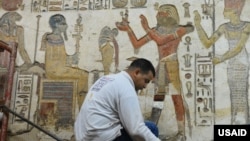An unexpected side effect of the COVID-19 pandemic is increased pressure on religious minorities, including violations of freedom of religion or belief. According to U.N. Special Rapporteur on freedom of religion or belief Ahmed Shaheed, “The pandemic has caused a flare-up in existing religious intolerance in many countries. I am alarmed to see the upsurge in incitement to hatred, scapegoating religious or belief communities, including Christians, Jews, and Muslims for the spread of virus.”
The fact is that 83 percent of the world’s population lives in places with high or very high restrictions on worship and religious expression, most of them targeting religious minorities. The coronavirus pandemic did not create these conditions, but it has made the situation worse.
For that reason, U.S. President Donald Trump on June 2 signed an Executive Order to advance international religious freedom by integrating it into U.S. diplomacy.
The Executive Order requires the Secretary of State to develop a plan within six months that will prioritize international religious freedom in the planning and implementation of United States foreign policy and the foreign assistance programs of the Department of State and the U.S. Agency for International Development, or USAID. It also provides at least $50 million per fiscal year for programs that advance international religious freedom.
“USAID will play a critical role in the implementation of the Executive Order,” said USAID Acting Administrator John Barsa in a written statement. “Americans have always believed our first freedom is the freedom of religion, and it is a key component of our national security strategy.”
USAID's efforts toward fulfillment of the President's Executive Order on Advancing International Religious Freedom will be managed by Samah Norquist, Senior Advisor on Religious Freedom and Pluralism in the Middle East. Ms. Norquist has “decades of experience working in international affairs and religious liberty issues in the Middle East and globally.”
“Promoting religious liberty is a pillar of our new multi-year country strategies,” said Acting Administrator Barsa.
“Whether in response to genocide committed against Christians and Yazidis in Northern Iraq, or the ethnic cleansing of the Muslim Rohingya in Burma, the institutional culture regarding international religious freedom has become a top priority at USAID.”














